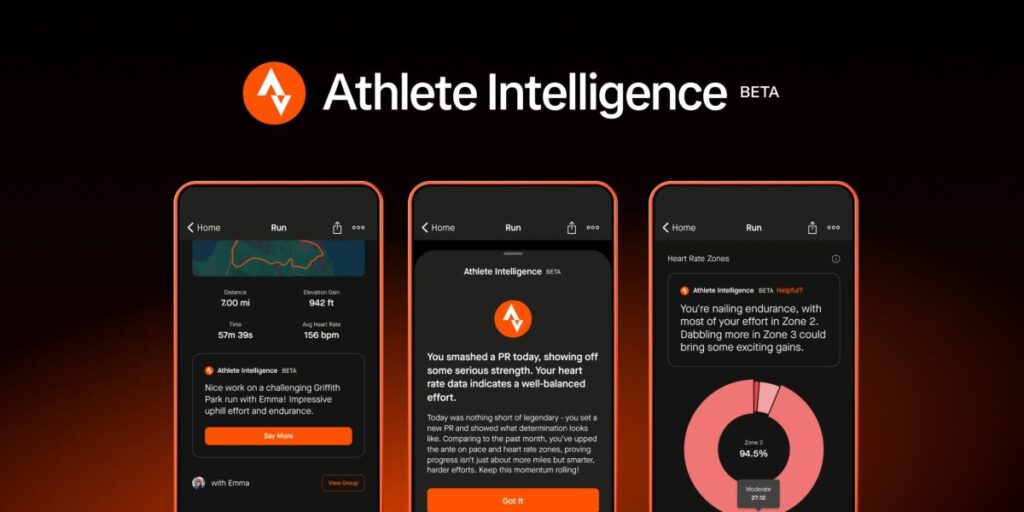Strava’s New AI Feature: Navigating Fitness with a Digital Coach
Last week, Brooklyn witnessed an unexpected encounter on its busy streets when 25-year-old video editor Nash Consing had a biking mishap—the result of a door swung open carelessly by a woman exiting an Uber. While the crash left him in need of an ambulance, it didn’t halt his enthusiasm for the fitness tracking app Strava. In fact, dazed from the collision and en route to the hospital, Consing managed to log an update for his followers. “Just got hit by a car,” he quipped, adding, “I’m heading to the hospital now lol. Rib might be f–ked.”
Little did Consing realize that on the very day of his crash, Strava had unveiled a new AI feature dubbed “Athlete Intelligence.” This tool enhances the app’s traditional metrics—like heart rate and speed—by offering personalized workout summaries delivered in the supportive voice of a coach.
Even amidst the shock of his accident, Consing couldn’t help but chuckle when Strava’s AI tool chimed in with its take on his abruptly halted bike ride. “Ouch, hope you’re okay after that car accident!” the AI exclaimed. “Despite the setback, your activity data shows you’re a consistent, well-rounded athlete—keep up the great work!”
Entering the AI Era with Athlete Intelligence
Strava, which launched in 2009, has cultivated a loyal following among fitness enthusiasts who diligently track their workouts and dispense “Kudos,” the app’s version of likes. However, the rollout of Athlete Intelligence hasn’t been all smooth sailing. Even eager users like Consing express skepticism, viewing this new feature as more of a novelty than a serious addition. “I do think it is more amusing, but also kind of pointless,” he remarked to Fortune. “It just feels more like a meme than anything right now.”
With over 125 million users and $150 million in venture backing, Strava stands at the pinnacle of fitness apps. In an interview with Fortune, Chief Product Officer Matt Salazar explained that the company created Athlete Intelligence for newer users who might struggle to digest the flood of information the app presents. “That’s really where we thought AI could solve a real consumer problem,” he stated, emphasizing its role in making exercise data more accessible.
Salazar added that the feature, which underwent initial testing at a closed conference in Los Angeles, has elicited an overwhelmingly positive response, featuring a healthy dose of humor. Some users have even enjoyed creating whimsical scenarios—one Reddit user reported that after inputting “abducted by aliens and probed,” the AI quipped about a “spike in heart rate” linked to an extraterrestrial encounter.
Are AI Features Worth It?
Nevertheless, while the humor is appreciated by some, not everyone is convinced of its utility. Critics argue that the feedback provided can be overly simplistic or incorrect. One user on Reddit encapsulated this sentiment with the view that the feature “doesn’t add value and probably costs them a ton of money.”
Salazar strives to defend Strava’s latest addition, indicating that it primarily caters to novice athletes. He refrained from discussing specific future developments but hinted that AI could assist with route suggestions. In recent years, Strava has focused more on mapping technology, buoyed by the acquisition of the Fatmap app in 2023.
As Strava continues to lead the market, it faces competition from other personalized fitness apps like Nike Run Club and Runna, which offer tailored training plans, as well as smartwatch brands like Garmin and Coros. Notably, Salazar mentioned that apps like Runna maintain compatibility with Strava, fostering a collaborative fitness landscape.
In the wake of the AI boom following the launch of OpenAI’s ChatGPT in late 2022, many companies have hurried to adopt AI features, sometimes with frustrating results. For example, when Google introduced an AI box atop its search function, users encountered glaring inaccuracies, including nonsensical recipe recommendations.
Salazar refutes the notion that Strava is merely jumping on the AI bandwagon. He insists that “putting in technology for technology’s sake, I agree, is not a worthwhile endeavor.” The aim, he asserts, is to genuinely address user needs.
Conclusion
With innovation at its core, Strava’s Athlete Intelligence could reshape how fitness enthusiasts engage with their workouts, potentially making tracking activity less daunting for newcomers. Whether you’re an experienced athlete or just starting your fitness journey, the evolving landscape of fitness technology promises exciting developments.
The AI Buzz Hub team is excited to see where these breakthroughs take us. Want to stay in the loop on all things AI? Subscribe to our newsletter or share this article with your fellow enthusiasts.




